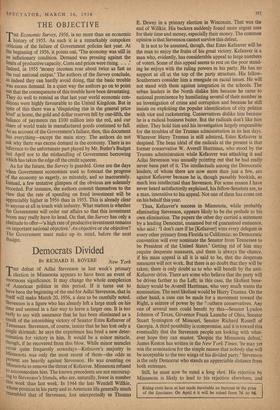THE OBJECTIVE
THE Economic Survey, 1956, is no more than an economic history of 1955. As such it is a remarkably outspoken criticism of the failure of Government policies last year. At the beginning of 1956. it points out, `The economy was still in an inflationary condition. Demand was pressing against the limits of productive capacity. Costs and prices were rising. . . Indeed, in 1955 'money incomes rose about twice as fast as the real national output.' The authors of the Survey conclude, as indeed they can hardly avoid doing, that the basic trouble Was excess demand. In a quiet way the authors go on to point out that the consequences of this trouble have been devastating. They do well to remind us that last year world economic con- ditions were highly favourable to the United Kingdom. But in Spite of this there was a 'disquieting rise in the general price level' at home, the gold and dollar reserves fell by one-fifth, the balance of payments ran £100 million into the red, and our share of world trade in manufactured goods continued to fall. As an account of the Government's failure, then, this document has everything—except the main story. The authors do not ask why there was excess demand in the economy. There is no reference to the unfortunate part played by Mr. Butler's Budget last April nor to the mishandling of Government borrowing which has taken the edge off the credit squeeze.
As for the future, the Survey is guarded. Gone are the days when Government economists used to forecast the progress of the economy so eagerly, so minutely, and so inaccurately. Instead, a few tentative glimpses of the obvious are solemnly recorded. For instance, the authors commit themselves to the view that the rate of spending on fixed investment will be appreciably higher in 1956 than in 1955. This is already clear to anyone at all in touch with industry. What matters is whether the Government will order our affairs so that this investment boom may really have its head. On that, the Survey has only a Platitude to offer—`a high rate of productive investment remains an important national objective.' An objective or the objective? the Government must make up its mind, before the next Budget.


































 Previous page
Previous page